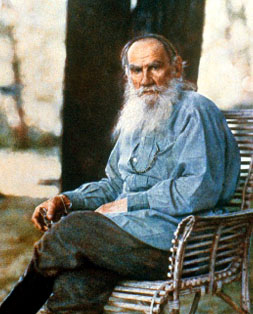ADVERTISEMENT
|
|
|
Russia Travel & Tourism Guide
Literature of Russia
NextGen Day offers travel tips and information for top travel places and best destinations in Africa, Asia, Australia, Europe, Middle East and United States of America. We feature Africa links, Africa resources and large selection of Africa budget airlines, Africa chartered planes, Africa sea cruises, Africa ferries, Africa travel agencies, Africa land transports and Africa attractions including Africa beaches, Africa medical tourism, Africa retirement homes, Africa historical and Africa pilgrimage tours.

Leo Tolstoy (1828–1910), writer
Russian literature is considered to be among the most influential and developed in the world, contributing much of the world's most famous literary works. Russia's literary history dates back to the 10th century and by the early 19th century a native tradition had emerged, producing some of the greatest writers of all time. This period and the Golden Age of Russian Poetry began with Alexander Pushkin, considered to be the founder of modern Russian literature and often described as the "Russian Shakespeare". Amongst Russia's most renowned poets and writers of the 19th century are Anton Chekhov, Mikhail Lermontov, Leo Tolstoy, Nikolai Gogol, Ivan Turgenev and Fyodor Dostoevsky. Ivan Goncharov, Mikhail Saltykov, Aleksey Pisemsky, and Nikolai Leskov made lasting contributions to Russian prose. Tolstoy and Dostoevsky in particular were titanic figures to the point that many literary critics have described one or the other as the greatest novelist ever.
By the 1880s Russian literature had begun to change. The age of the great novelists was over and short fiction and poetry became the dominant genres of Russian literature for the next several decades which became known as the Silver Age of Russian Poetry. Previously dominated by realism, symbolism dominated Russian literature in the years between 1893 and 1914. Leading writers of this age include Valery Bryusov, Andrei Bely, Vyacheslav Ivanov, Aleksandr Blok, Nikolay Gumilev,Dmitry Merezhkovsky, Fyodor Sologub, Anna Akhmatova, Osip Mandelstam, Marina Tsvetaeva, Leonid Andreyev, Ivan Bunin and Maxim Gorky.
Following the Russian Revolution of 1917 and the ensuing civil war, Russian cultural life in was left in chaos. Some established writers left Russia while a new generation of talented writers who had at least some sympathy for the ideals of the revolution was emerging. The most ardent of these joined together in writers organizations with the aim of creating a new and distinctive proletarian culture appropriate to the new state. Throughout the 1920s writers enjoyed broad tolerance. In the 1930s censorship over literature was tightened in line with Joseph Stalin's policy of socialist realism. After his death several thaws took place and restrictions on literature were eased. By the 1970s and 1980s, writers were increasingly ignoring the guidelines of socialist realism. The leading writers of the Soviet era included Yevgeny Zamiatin, Isaac Babel, Ilf and Petrov, Yury Olesha, Vladimir Nabokov, Mikhail Bulgakov, Boris Pasternak, Aleksandr Solzhenitsyn, Vladimir Mayakovsky, Mikhail Sholokhov, Yevgeny Yevtushenko and Andrey Voznesensky.
Source : Wikipedia Encyclopedia
Hotels, Vacations & Holidays in Russia, Europe |

